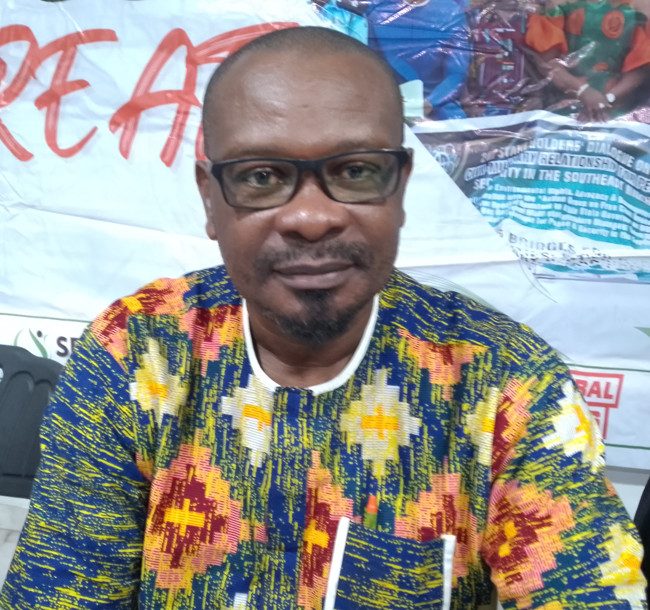By Okechukwu Nwanguma
The recent and continuing harassment of Mr Joseph Edeh by officers of the Nigeria Police Force (NPF), despite multiple pending court cases and a subsisting judicial order, exemplifies the deep-rooted culture of impunity, abuse of power, and contempt for the rule of law that continues to undermine policing and justice in Nigeria.
Mr Edeh’s ordeal is a chilling reminder of how the police – entrusted with enforcing the law – can sometimes become tools in the hands of private individuals to settle personal scores, subvert justice, and humiliate innocent citizens.
*A Matter Before Multiple Courts*
Mr Joseph Edeh and his estranged wife, Mrs Gloria Edeh, are parties to several civil and matrimonial proceedings before competent courts in Lagos, Abuja, and Enugu.
These include:
– Suit No. MIK/1138/2022 (Magistrate Court, Ogba) – where Mrs Edeh sought to compel her husband to sell his aluminium fabrication business and share the proceeds;
– Suit No. FHC/ABJ/CS/1591/2023 (Federal High Court, Abuja) – a fundamental rights case filed by Mr. Edeh against the Inspector-General of Police and others after earlier harassment;
– Suit No. ID/1439HD/2024 (High Court, Ikeja) – divorce proceedings seeking dissolution of marriage and division of property; and
– Suit No. FHC/E/CS/161/2023 (Federal High Court, Enugu) – where Mr Edeh is seeking to remove Mrs Edeh as a director/shareholder of his company.
These matters are sub judice, and in November 2024, the Federal High Court, Abuja, issued an order directing all parties to maintain the status quo ante pending the determination of the fundamental rights suit.
*Police Intervention Despite a Court Order*
Despite this clear judicial directive, officers of the Force Criminal Investigation Department (FCID), Abuja, acting at the instance of Mrs Edeh, have continued to harass and intimidate Mr Edeh.
Disturbed by these illegalities, the Open Society on Justice Reform Project (OSJRP) and the Rule of Law and Accountability Advocacy Centre (RULAAC) jointly petitioned the Inspector-General of Police (IGP) on November 5, 2025, calling for immediate compliance with the court order and urging the police to refrain from further interference in the dispute.
The Project Lead of OSJRP, Mr. Sam Akpologun, also personally engaged the Assistant Commissioner of Police (ACP) handling the case at the FCID, reminding him of the subsisting court order and the constitutional limits of police authority in civil disputes.
*Instead of Restraint, an Escalation*
Shockingly, rather than heed these interventions or respect the rule of law, the police escalated their actions against Mr. Edeh.
On November 11, 2025 – barely six days after the petition – the FCID, under the supervision of DCP Ibrahim Mohammed, issued formal letters to several banks ordering the freezing of all accounts linked to Mr. Edeh, demanding access to account documents, deactivation of electronic channels, and even directing that any person transacting on the accounts be arrested on sight and handed over to FCID officers.
These directives, referencing document INVESTIGATION_20251112_0001.pdf, are manifestly illegal, unconstitutional, and contemptuous of the standing order of the Federal High Court.
To justify their actions, the FCID officers relied on an ex parte order purportedly obtained from the High Court of Nasarawa State on November 11, 2025—a court with no territorial or subject matter jurisdiction over a dispute rooted entirely in Lagos, Abuja, and Enugu.
The resort to this Nasarawa order – clearly obtained to circumvent the Federal High Court’s subsisting directive – amounts to forum shopping and abuse of judicial process, facilitated by apparent collusion between police officers and Mrs Edeh.
*A Brazen Violation of Rights*
The police actions violate several constitutional and statutory provisions, including:
i. Sections 35 and 36 of the 1999 Constitution guarantee liberty and fair hearing;
ii. Section 44, protecting the right to property; and
iii. Sections 3, 4, 32, and 35 of the Police Act 2020, which restrict police powers to lawful, proportionate, and professional use.
Freezing Mr. Edeh’s accounts without a valid order and threatening arrests over a private marital dispute is not only a gross abuse of authority, it also inflicts economic hardship and reputational damage on a private businessman who has repeatedly sought judicial protection.
*Beyond One Man’s Ordeal*
This case goes beyond Mr Edeh. It exposes a pattern of police complicity in private disputes, where officers act as debt collectors, enforcers, or instruments of intimidation – undermining judicial authority and eroding citizens’ trust in law enforcement.
When the police disregard court orders and act in contempt of judicial authority, they not only victimise individuals; they attack the foundation of justice and democracy itself.
If such conduct continues unchecked, citizens will lose confidence in both the police and the courts, leading to dangerous consequences for national stability.
*Restoring the Rule of Law*
The Police Service Commission (PSC) and the National Human Rights Commission (NHRC) must urgently investigate this matter, sanction the officers involved, and issue clear directives prohibiting police interference in civil or matrimonial disputes pending before courts.
The Inspector-General of Police must also assert command responsibility by ensuring that the Nigeria Police Force operates strictly within the law. The use of police powers for private vendettas or to frustrate court orders must no longer be tolerated.
Respect for the rule of law is the cornerstone of any democratic society. The police, as enforcers of the law, must not become violators of the very principles they are sworn to uphold.
The persecution of Mr Joseph Edeh, despite multiple pending court cases and a subsisting judicial order ,is a grave affront to justice and due process. It demands not silence or bureaucratic evasion, but decisive action by oversight institutions to reaffirm that no one – not even the police – is above the law.
Nigeria cannot build a just and secure society when its law enforcement agencies routinely flout the law with impunity.
The time has come to draw a line firmly and publicly in defence of the rule of law, human dignity, and police accountability.
By Okechukwu Nwanguma, Executive Director, Rule of Law and Accountability Advocacy Centre (RULAAC)



